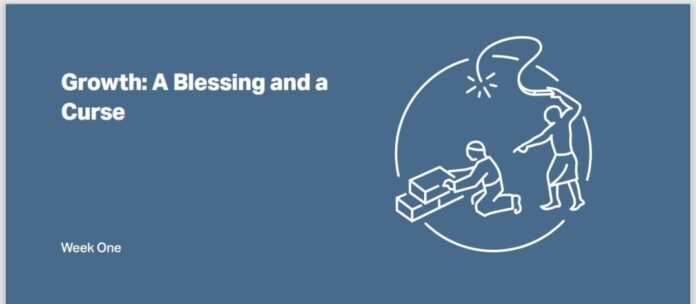Growth: A Blessing and a Curse | Week 01
Week’s Passage : Exodus 1
inTro
Blessed through Curses
The passage reflects on how rapid growth can be followed by unexpected hardship, using the story of the Israelites as an example. God had promised Jacob that his family would become a great nation in Egypt, which was a challenging promise given the importance of staying in the Promised Land, as emphasized by Abraham and Isaac. Although the Israelites did multiply and flourish in Egypt, fulfilling God’s command to be fruitful, their growing numbers eventually led to their oppression. What once looked like a blessing now seemed to threaten their survival, making God’s promise appear in jeopardy.
inGest
Time is Everything
The Bible provides few details about the Israelites’ time in Egypt, including when and how their enslavement began. Despite their growing numbers, they likely remained in Egypt because they were settled and comfortable, and the process of enslavement may have happened gradually. Scholars debate the timing of the Exodus, with some placing it around 1230–1220 B.C. based on archaeology, while others, relying on 1 Kings 6:1 and the dating of Solomon’s temple, suggest it occurred around 1446–1447 B.C. These differing views reflect ongoing tension between biblical accounts and archaeological evidence. Ultimately, while archaeology can support faith, Christian belief is not solely dependent on scientific validation it remains rooted in faith, even as evidence may strengthen it.
InTerpret
Two Amazing Women
Pharaoh’s attempt to reduce the Israelite population through slavery failed, so he ordered all newborn Hebrew boys to be killed, hoping to slow their growth. Despite the impracticality of this strategy and its potential impact on the slave workforce, Pharaoh proceeded out of desperation. He assigned two midwives, Shiphrah and Puah, to carry out this command. It’s unclear if they served all Israelites or a specific group, but what stands out is their faith and courage. They feared God more than Pharaoh and refused to obey his order. As a result, God honored them, even giving them a rare place of named recognition in the Bible.
These women resisted Pharaoh’s command before any of the plagues showed God’s power. Their faith led them to act when it seemed Egypt’s gods were stronger. They cleverly told Pharaoh that the Hebrew women gave birth too quickly for intervention, using the word “lively” as a subtle irony. In the end, God used these two ordinary women to defy the most powerful man on earth, reminding us that He often works through the least expected people to fulfill His plan.
inVite
Jesus, The new Israel
Some Christians today believe in Jesus but doubt the historical truth of the stories in the books of Moses, treating them as symbolic or devotional rather than real events. This is problematic because Jesus affirmed and quoted from Moses’ writings, even saying that rejecting Moses is rejecting Him (John 5:46–47).
Jesus’ life and mission are deeply connected to Israel’s history. Like Israel, Jesus took refuge in Egypt and later returned to fulfill God’s purpose. He chose twelve disciples just as Israel had twelve sons. Both Israel and the early church experienced rapid growth, which led to persecution. Similarly, Jesus’ ministry grew quickly but faced opposition, which is why He sometimes told people not to spread news of His miracles. The parallel between Israel’s journey and Jesus’ life highlights the importance of taking the writings of Moses seriously to fully understand Christ.
InSight
The Beginning of Egyptian Slavery
Joseph’s service to Egypt brought great blessings, his leadership during the famine enriched the nation, earned the Israelites royal favor, exemption from taxes, and a place to live. The king openly acknowledged that it was Joseph’s God who had saved Egypt. However, after Joseph and his generation died, a new king arose who chose to forget Joseph’s legacy. Though aware of Joseph’s contributions, he deliberately ignored them.
Fearing the growing numbers of Israelites and their potential alliance with enemies in times of war, the king decided to oppress them rather than expel them, since they were valuable workers. Israelites, though numerous and strong, remained a separate people in culture and religion. Taskmasters were appointed, and their slavery became harsh and bitter. Yet, despite the oppression, the more they were afflicted, the more they multiplied and grew.
InQuire
- What parts of this story are most challenging for you living in the modern world?
- Why did the Israelites lose favor with Pharaoh?
- Why do you think God allowed Israel to end up in slavery to the Egyptians?
- How should you respond when people make your life “bitter with hard bondage” (Exod. 1:14)?



